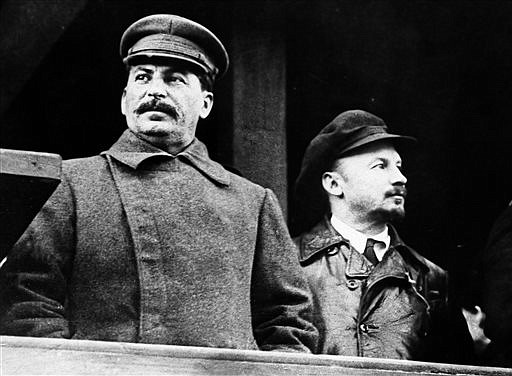"In the spring of 1932 desperate officials, anxious for their jobs and even their lives, aware that a new famine might be on its way, began to collect grain wherever and however they could. Mass confiscations occurred all across the USSR. In Ukraine they took on an almost fanatical intensity."
I am quoting a few lines from "Red Famine," Anne Applebaum's brilliant new history of the deliberate policy of mass starvation inflicted on Ukraine by Josef Stalin in the early 1930s. An estimated 5 million or more people perished in just a few years. Walter Duranty, The Times' correspondent in the Soviet Union, insisted the stories of famine were false. He won a Pulitzer Prize in 1932 for reportage the paper later called "completely misleading."
How many readers, I wonder, are familiar with this history of atrocity and denial, except in a vague way? How many know the name of Lazar Kaganovich, one of Stalin's principal henchmen in the famine? What about other chapters large and small in the history of communist horror, from the deportation of the Crimean Tatars to the depredations of Peru's Shining Path to the Brezhnev-era psychiatric wards that were used to torture and imprison political dissidents?
Why is it that people who know all about the infamous prison on Robben Island in South Africa have never heard of the prison on Cuba's Isle of Pines? Why is Marxism still taken seriously on college campuses and in the progressive press? Do the same people who rightly demand the removal of Confederate statues ever feel even a shiver of inner revulsion at hipsters in Lenin or Mao T-shirts?
These aren't original questions. But they're worth asking because so many of today's progressives remain in a permanent and dangerous state of semi-denial about the legacy of communism a century after its birth in Russia.
No, they are not true- believing communists. No, they are not unaware of the toll of the Great Leap Forward or the Killing Fields. No, they are not plotting to undermine democracy.
But they will insist there is an essential difference between Nazism and communism - between race-hatred and class-hatred; Buchenwald and the gulag - that morally favors the latter. They will attempt to dissociate communist theory from practice in an effort to acquit the former. They will balance acknowledgment of the repression and mass murder of communism with references to its "real advances and achievements." They will say that true communism has never been tried.
I recently noted that intellectuals have a long history of making fools of themselves with their political commitments, and that the phenomenon is fully bipartisan.
But the consequences of the left's fellow-traveling and excuse-making are more dangerous. Venezuela is today in the throes of socialist dictatorship and humanitarian ruin, having been cheered along its predictable and unmerry course by the usual progressive suspects.
One of those suspects, Jeremy Corbyn, may be Britain's next prime minister, in part because a generation of Britons has come of age not knowing that the line running from "progressive social commitments" to catastrophic economic results is short and straight.
Bernie Sanders captured the heart, if not yet the brain, of the Democratic Party last year by portraying "democratic socialism" as nothing more than an extension of New Deal liberalism. But the Vermont senator also insists that "the business model of Wall Street is fraud."
It's a bitter fact that the most astonishing strategic victory by the West in the last century turns out to be the one whose lessons we've never seriously bothered to teach, much less to learn. An ideology that at one point enslaved and immiserated roughly a third of the world collapsed without a fight and was exposed for all to see. Yet we still have trouble condemning it as we do equivalent evils. And we treat its sympathizers as romantics and idealists, rather than as the fools, fanatics or cynics they really were and are.
Winston Churchill wrote that when the Germans allowed the leader of the Bolsheviks to travel from Switzerland to St. Petersburg in 1917, "they turned upon Russia the most grisly of all weapons. They transported Lenin in a sealed truck like a plague bacillus."
A century on, the bacillus isn't eradicated, and our immunity to it is still in doubt.
The New York Times
